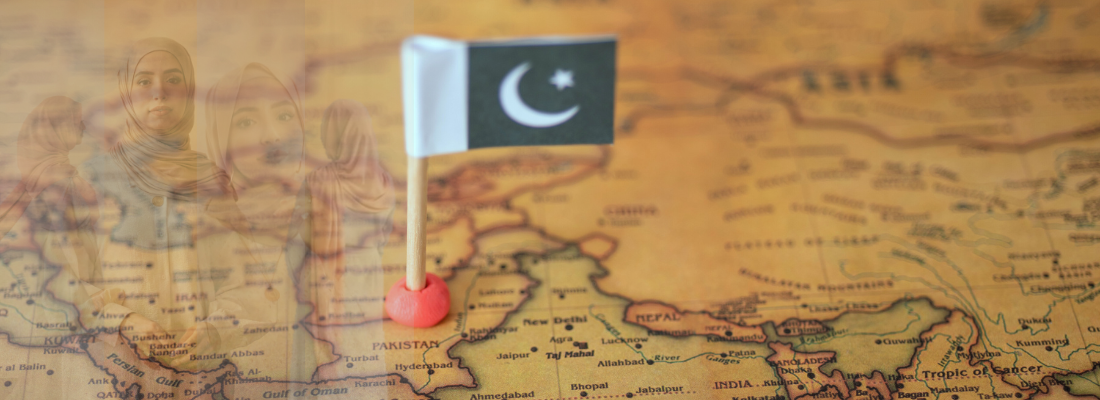The IBAHRI commends Pakistan’s landmark ruling in marital rape case
Thursday 15 February 2024

The International Bar Association’s Human Rights Institute (IBAHRI) commends Pakistan for legal reform that strengthens women's rights in marriage and criminalises unconsented sexual acts. The change in law has led to a ground-breaking judgement and the first conviction for marital rape in Sindh Province, on 15 January 2024, wherein a Karachi sessions court convicted a man for having non-consensual sex with his wife, sentencing him to three years imprisonment.
The judgment comes after the man’s wife accused him of engaging in forced sexual acts and sodomy that constituted a violation under Section 377 of the Pakistan Penal Code (PPC), which outlaws ‘unnatural offences’. Although the ruling was on the basis of ‘unnatural offences’, it sets a new precedent in prosecuting and convicting perpetrators of marital rape, particularly following legislative amendments to the PPC.
Advocate Bahzad Akbar, representing the complainant, argued that ‘sodomy falls within the definition of rape and marital rape in this case after an amendment was brought to Section 375 of the PPC in 2021’. Prior to September 2018, there had not been a single case of marital rape filed or prosecuted in Pakistan. The amendment marks a significant milestone in the fight against sexual violence within marital relationships, and in cementing informed consent.
The amendment’s introduction brought about substantial advancements to the existing framework, with the primary objective of better safeguarding and support for survivors of sexual assault, where previous acts fell short. The amendment, part of the Criminal Law Amendment Act of 2021, was championed by former Parliamentary Secretary for Law and Justice, Maleeka Bokhari, under the Pakistan Tehreek-e-Insaf (PTI) government, and co-drafted with former Law Minister, Farogh Naseem.
The IBAHRI acknowledges and commends Ms Bokhari for her tireless efforts and leadership in advocating for the rights of women and ensuring that the legal system addresses heinous crimes like marital rape.
IBAHRI Director, Baroness Helena Kennedy KC, emphasised the transformative effect of this legal change on women's rights in Pakistan, stating: ‘This ruling affirms that marital rape does in fact exist in Pakistan, and that marriage does not mean automatic consent. It, together with the amendment to Section 335, signifies a crucial step forward in advancing the rights of women, reinforcing women’s sexual autonomy, and providing increased protection in domestic abuse cases. Such legislative changes are instrumental in dismantling systemic barriers and fostering a culture of gender equality.’
The non-governmental organisation (NGO) War Against Rape (WAR) outlined in its 2020-2021 report that in Pakistan, more than 22,037 rape cases were reported to the police across the country in the last six years, and of the total cases, 4,060 are pending in court, of which, only 77 accused have been convicted, comprising 0.3 per cent of the total figure. Only 18 per cent of cases have reached the prosecution stage. The NGO stated that only 41 per cent of rape cases are reported to the police due to social pressures and other procedural deterrents and gaps in the justice system.
IBAHRI Co-Chair and Immediate Past Secretary General of the Swedish Bar Association, Anne Ramberg Dr Jur hc stated: ‘We commend the Sindh sessions court verdict in pursuing justice in this case, which may pave the way for a shift in legal attitudes towards marital rape and informed consent in Pakistan. Securing this conviction not only illustrated the concrete benefits of legal reform, but also showed that this case represents just the beginning of the country's efforts to restore women's sexual autonomy. We encourage the continued pursuit of justice in similar cases to foster a safer environment for women.’
Mark Stephens, CBE Co-Chair warmly welcomed Pakistan's advancement in the law of marital rape, saying, 'Discriminatory sexual offence laws, most of which are a legacy of 19th century colonial penal codes where women were seen as chattels of men, continue to blight the lives of millions of women around the globe. This is one form of sexual violence which will now be rightly criminalised and will protect women in Pakistan from such violence. These laws foster and enable violence and discrimination, and they are at odds with international and regional human rights norms and domestic constitutional law – and we exhort other countries to follow the example set by Pakistan.'
The IBAHRI urges nations around the world to take note of Pakistan's commitment to advancing human rights through legal reform and judicial decisions. The Institute remains dedicated to supporting initiatives to promote justice, equality and the protection of human rights globally.
ENDS
For further information, please contact: the IBA Human Rights Institute at IBAHRI@int-bar.org
Notes to the Editor
- Related material:
-
The International Bar Association’s Human Rights Institute (IBAHRI), established in 1995 under Founding Honorary President Nelson Mandela, is an autonomous and financially independent entity, working to promote, protect and enforce human rights under a just rule of law, and to preserve the independence of the judiciary and the legal profession worldwide.
- Find the IBAHRI (@IBAHRI) on social media here:
-
The International Bar Association (IBA), the global voice of the legal profession, is the foremost organisation for international legal practitioners, bar associations and law societies. Established in 1947, shortly after the creation of the United Nations, it was born out of the conviction that an organisation made up of the world's bar associations could contribute to global stability and peace through the administration of justice.
The IBA acts as a connector, enabler, and influencer, for the administration of justice, fair practice, and accountability worldwide. The IBA has collaborated on a broad range of ground-breaking, international projects with the United Nations, the European Parliament, the Council of Europe, The Commonwealth, the Organisation for Economic Co-operation and Development (OECD), the World Trade Organization, the International Monetary Fund and the World Bank, among others.
Website page link for this news release:
Short link: www.tinyurl.com/4nh4ezuy
Full link: www.ibanet.org/The-IBAHRI-commends-Pakistans-landmark-ruling-in-marital-rape-case
